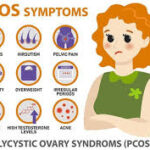
Introduction
Women’s health encompasses a wide range of topics that affect physical, hormonal, and emotional well-being. From managing Polycystic Ovary Syndrome (PCOS) to understanding the menstrual cycle, fertility, menopause, and pregnancy wellness, it is vital for women to understand how to care for their bodies at every life stage.
This comprehensive guide provides evidence-based strategies, nutritional tips, and wellness advice across five key areas of women’s health: PCOS management and diet, menstrual cycle health, fertility and ovulation tracking, menopause symptoms and support, and pregnancy nutrition and fitness.
PCOS Management and Diet
Polycystic Ovary Syndrome (PCOS) is a hormonal disorder affecting 1 in 10 women of reproductive age. Common symptoms include irregular periods, weight gain, acne, and infertility. While there’s no cure for PCOS, it can be managed effectively through diet, lifestyle, and medical guidance.
Best Diet for PCOS:
- Low Glycemic Index (GI) Foods: Helps regulate blood sugar. Include whole grains, vegetables, and legumes.
- High-Fibre Diet: Improves insulin sensitivity and reduces inflammation. Add leafy greens, oats, and chia seeds.
- Lean Protein Sources: Stabilize blood sugar and reduce cravings. Choose chicken, fish, tofu, and legumes.
- Healthy Fats: Omega-3 fatty acids in flaxseeds, walnuts, and salmon help reduce androgen levels.
Lifestyle Tips:
- Exercise regularly (30–45 minutes of moderate activity daily)
- Reduce refined sugars and processed foods
- Manage stress with mindfulness and relaxation techniques
- Consider supplements like inositol, zinc, and vitamin D (under medical supervision)
Menstrual Cycle Health
Understanding your menstrual cycle is key to identifying normal versus abnormal patterns, predicting ovulation, and recognizing signs of hormonal imbalances.
Phases of the Menstrual Cycle:
- Menstrual Phase (Day 1–5): Shedding of the uterine lining
- Follicular Phase (Day 1–13): Hormones stimulate egg growth
- Ovulation (Day 14): The mature egg is released
- Luteal Phase (Day 15–28): Hormones prepare the body for possible pregnancy
Tips for a Healthy Cycle:
- Eat an anti-inflammatory diet rich in leafy greens, berries, and healthy fats
- Stay hydrated and get at least 7–8 hours of sleep
- Track symptoms like pain, heaviness, and irregularity
- Consider herbal teas (e.g., ginger or raspberry leaf) for cramp relief
- See a doctor if cycles are consistently irregular, very heavy, or painful
Fertility Tips and Ovulation Tracking
Fertility is influenced by various factors including age, diet, lifestyle, and overall reproductive health. Tracking ovulation is a powerful tool for increasing the chances of conception.
Signs of Ovulation:
- Increase in cervical mucus (clear and stretchy)
- A slight rise in basal body temperature
- Ovulation pain (mild cramping on one side)
- Increased libido and energy
Fertility Tips:
- Track ovulation using apps or ovulation predictor kits (OPKs)
- Maintain a healthy BMI; being underweight or overweight affects ovulation
- Limit caffeine and alcohol
- Get regular exercise and sleep
- Focus on nutrient-rich foods, especially folate, iron, and zinc
- Reduce stress through yoga, journaling, or therapy
If you’ve been trying to conceive for over a year (or six months if over age 35), it’s time to consult a fertility specialist.
Menopause Support and Symptoms
Menopause typically occurs between ages 45 and 55 and marks the end of a woman’s reproductive years. It is diagnosed after 12 consecutive months without a period and is preceded by perimenopause, a phase with fluctuating hormones and symptoms.
Common Symptoms:
- Hot flashes and night sweats
- Mood swings and irritability
- Sleep disturbances
- Vaginal dryness
- Weight gain, especially around the abdomen
Natural Menopause Support:
- Phytoestrogens: Plant-based compounds in soy, flaxseeds, and lentils mimic estrogen
- Exercise: Boosts mood, supports metabolism, and reduces stress
- Calcium and Vitamin D: Protect against bone loss; include dairy, leafy greens, and fortified foods
- Hydration and cooling techniques: Reduce hot flashes
- Black cohosh and evening primrose oil: Herbal remedies that may ease symptoms (consult your doctor first)
Menopause is a normal transition, not a medical condition. Support from healthcare providers, family, and lifestyle adjustments can significantly ease the experience.
Pregnancy Nutrition and Fitness
Nutrition and movement are vital during pregnancy to support the health of both mother and baby. Nutrient needs increase to accommodate fetal growth and maternal energy requirements.
Key Nutrients for Pregnancy:
- Folic Acid: Prevents neural tube defects. Recommended 400–800 mcg daily.
- Iron: Supports blood volume and oxygen transport. Include lean meats, beans, and leafy greens.
- Calcium: Builds baby’s bones. Dairy products, fortified orange juice, and spinach are good sources.
- Protein: Essential for tissue growth. Aim for 75–100 grams daily.
- Omega-3 Fatty Acids: Promote brain development. Choose salmon, walnuts, and chia seeds.
Safe Pregnancy Fitness:
- Walking: Low-impact and safe throughout pregnancy
- Prenatal Yoga: Improves flexibility, reduces stress, and prepares for labor
- Swimming: Supports weight, reduces swelling, and eases back pain
- Strength training: Helps maintain muscle tone (use light weights and proper form)
Avoid high-risk activities like contact sports, hot yoga, and heavy lifting. Always consult your doctor before beginning or continuing an exercise program while pregnant.
Conclusion
Women’s health is complex, evolving through different life stages, each with unique challenges and needs. From managing PCOS through diet and lifestyle changes to tracking fertility, navigating menstrual cycles, dealing with menopause, and ensuring optimal pregnancy health—being informed empowers women to take control of their well-being.
Prioritizing nutrition, movement, stress management, and regular health checkups can significantly enhance quality of life. Whether you’re aiming to regulate your cycle, boost fertility, or embrace menopause with confidence, holistic wellness begins with knowledge and self-care.
Leave a Reply